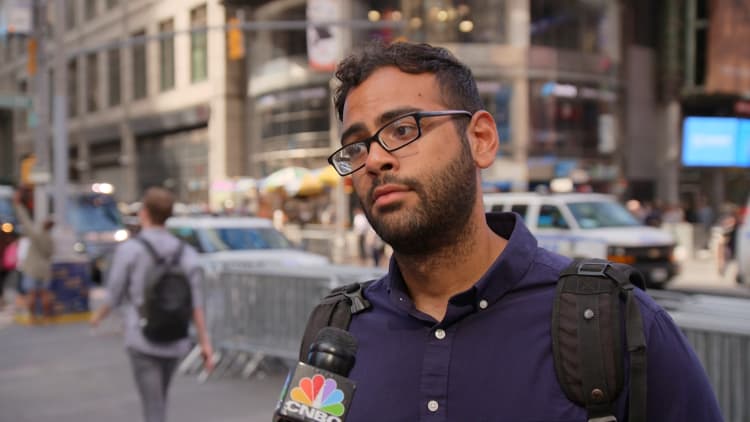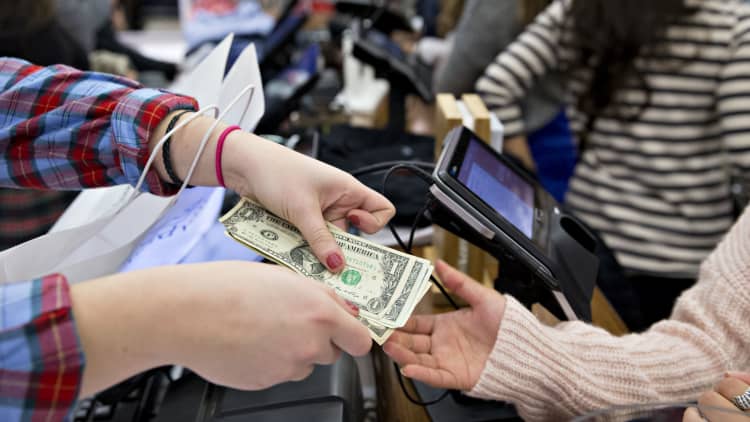
Money may have potential, but there are only so many things you can do with a dollar.
Spend it. Save it. Donate it. Invest it.
Mostly we seem to want to spend it. Or do we?
Contrary to what you might think, the real minority is spenders. That's good news, since some people save so they can invest for their future financial stability.
At least, when answering questions for the Invest in You Spending Survey, more people described themselves as savers, at 54%. The national survey of 2,800 Americans was conducted June 17–20 by CNBC + Acorns in partnership with SurveyMonkey.
A diverse group of men and women were polled across the country, ranging in ages from 18 to over 65, on their money habits. The survey also looked at changes in people's money behaviors.
Quite a few people seem to be thinking about spending and preparing for what-ifs — a positive turn, according to former FDIC chair Sheila Bair, member of CNBC Financial Wellness Advisory Council.
Individual observations can be meaningful, whether it's a personal observation that the economy is booming — unemployment is low, the stock market is high — or that a recession is coming: the good times can't last; we're headed for a downturn.
"There is some wisdom in the insights of people on the ground," Bair said. "In their own spending and saving and work experiences day to day, people can sometimes pick up on (subtle) cues that may not be readily apparent in aggregate data."

A nation of savers
Across all age groups, spending versus savings habits were fairly equal, with slightly more savers, until the 35- to 44-year-old group, which showed higher levels of spending. Then the savings rates start to spike, along with people's ages.
Savings rates soar in the seniors group in or nearing retirement, with 63% describing themselves as savers. Just 28% called themselves spenders.
Who's spending less?
A third of Americans say they've cut spending in the last year, and that percentage is about the same no matter the demographic. Reasons for spending less ranged from a loss of household income and new debt to fear of recession, job loss or large medical bills from an unexpected illness or injury.
The greatest percentage of those spending less say they did it because of job loss, followed by people who took on new debt. Fear of a coming recession is also fueling anxiety amid signs of a possible slowdown.
The number of Americans filing applications for unemployment benefits rose more than expected last week. Bonds signal a possible economic slowdown, while equities suggest growth could continue.
There is one notable statistic: African-American respondents were far likelier to say they'd cut spending, at 43%. Only one other group, divorced men, came close at 39%.
One explanation, according to Laura Wronski, chief researcher at SurveyMonkey in San Mateo, California, could be unemployment: The survey also found that twice as many black respondents as whites pointed to "loss of job" as the reason they were spending less (26% vs 13%).
In other recent surveys, Wronski said most people say jobs and the economy are the most important issues. "This ranks high for everyone, and much more so for blacks," Wronski said, but it's especially critical to African-Americans. "Jobs and the economy is the No. 1 issue for blacks by a wider margin," she said.
Unemployment among blacks is an economic issue that is not getting enough attention, according to Wronski.
Although unemployment for African-Americans fell last year to 6.6%, one of the lowest levels since 1972, jobs remain a systemic and long-term problem, according to Marc Morial, president and CEO of the National Urban League.
It makes sense that this could result in lower spending.
"When you look at national statistics, while unemployment numbers are at an all-time low, unemployment is still persistently higher among blacks than whites," Wronski said. "If you lose your job, you have to make some hard trade-offs in your life."
More from Invest in You:
Men spend more on impulse buys than women. Here are 6 ways to break the habit
Majority of Americans say they won't donate to 2020 presidential campaigns
College costs are skyrocketing. Here's how to decide if that high price tag is worth it
Political leanings affect spending
Is a recession coming? Your answer could depend on who you're voting for.
Twice as many Democrats as Republicans said they'd cut their spending due to anxiety over the economy.
If people feel leery about the economy to the extent that it makes them cautious, that's a good thing, Bair said.
"I'm for anything that increases financial resilience," she said. "If you're trying to do forecasting, it's better to be on the conservative side and increase your cash reserves. Where's the harm in that?"
Trying to predict the direction of the economy, though, might be a waste of resources. "It's like trying to time the stock market," Bair said. "You'll never get it right."
Republicans are far likelier than Democrats to say their confidence in the economy led them to spend more.
Overall, though, Democrats were more likely than Republicans to say they are spending more.
'I just had to have it'
When it comes to impulse spending, one gender definitely spends more. And it's not women.
Men are just as likely as women to buy on the spur of the moment, and their purchases are more expensive: 23% of men say they spent more than $100 the last time they made an impulse buy, vs. 16% of women.
Where'd the money go?
Takeout or delivery meals were the top expense, with 28% of the general population. But those who identify themselves as spenders are far more likely than savers to say they spend $200 a month on convenience meals.
People seem to have their spending under control, Wronski said, noting the survey didn't show much spending on alcohol or tobacco. "People are aware of the amount of money they're spending and trying to spend it responsibly."
Slightly less than a quarter of those who increased their spending say it was due to getting a better-paying job.
Check out What entrepreneurs like Daymond John and Ryan Serhant learned about money from summer jobs via Grow with Acorns+CNBC.
Disclosure: NBCUniversal and Comcast Ventures are investors in Acorns.





